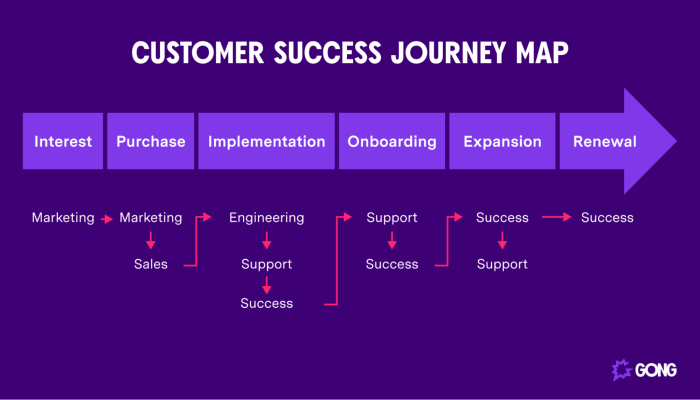Customer Success Tips takes center stage, inviting readers into a world of strategic insights and innovative approaches to enhance customer relationships and drive growth. From personalized strategies to key metrics, this guide offers a comprehensive look at maximizing customer success.
Importance of Customer Success
Customer success is like the secret sauce for a business’s growth recipe. It’s all about making sure your customers are not just satisfied, but they are thriving with your product or service. This leads to happy customers who stick around, refer others, and ultimately drive revenue growth.
Examples of Companies Excelling in Customer Success
- Amazon: Known for its exceptional customer service and personalized recommendations, Amazon goes above and beyond to ensure customer satisfaction.
- Zappos: This online shoe retailer has built a reputation for its outstanding customer service, offering free shipping both ways and a 365-day return policy.
- Apple: Apple’s customer service is top-notch, with dedicated Apple Geniuses in stores and a robust online support system.
Impact of Customer Success on Customer Retention and Loyalty
Customer success plays a crucial role in customer retention and loyalty. When customers feel supported, valued, and successful in using a product or service, they are more likely to remain loyal and continue doing business with the company. This leads to higher customer lifetime value and a strong foundation for long-term relationships.
Strategies for Effective Customer Success

When it comes to customer success, having the right strategies in place can make all the difference. Let’s dive into some key approaches that can help you ensure your customers are happy and satisfied.
Proactive vs. Reactive Approaches
Proactive customer success involves anticipating needs and issues before they arise, while reactive customer success involves addressing problems as they come up. A proactive approach can help prevent customer churn and build stronger relationships.
Significance of Personalized Strategies
Personalized customer success strategies take into account the unique needs and preferences of each customer. By tailoring your approach to individual customers, you can increase satisfaction and loyalty.
Leveraging Technology for Better Management
Technology can play a key role in customer success management. Utilize customer relationship management (CRM) software to track customer interactions, automate processes, and analyze data to better understand your customers’ needs.
Building Strong Customer Relationships

Building strong customer relationships is essential for the success of any business. Effective communication plays a crucial role in nurturing these relationships, as it helps in understanding customer needs, addressing concerns, and building trust.
Role of Communication in Nurturing Customer Relationships
Communication is key in maintaining strong customer relationships. By actively listening to customer feedback, providing timely responses to inquiries, and keeping customers informed about products or services, businesses can enhance their relationships with customers. Regular communication also allows for building rapport and showing customers that their opinions are valued.
- Respond promptly to customer inquiries through various channels such as email, phone, or social media.
- Provide updates on new products, services, or promotions to keep customers engaged and informed.
- Seek feedback from customers through surveys or feedback forms to understand their needs and preferences.
Successful Customer Relationship Management Techniques
Successful customer relationship management techniques involve personalized interactions, proactive support, and consistent follow-ups. By understanding each customer’s unique needs and preferences, businesses can tailor their approach to provide a more personalized experience.
- Use customer relationship management (CRM) software to track customer interactions and personalize communication.
- Offer proactive support by anticipating customer needs and providing solutions before issues arise.
- Follow up with customers after a purchase to ensure their satisfaction and address any concerns they may have.
Importance of Empathy and Understanding in Customer Interactions
Empathy and understanding are essential in customer interactions as they help in building trust, resolving conflicts, and creating positive experiences for customers. By putting themselves in the customer’s shoes, businesses can better understand their needs and provide more empathetic support.
- Show empathy towards customers by acknowledging their concerns and demonstrating a willingness to help.
- Listen actively to customer feedback and address any issues with a positive and understanding attitude.
- Empower employees to make decisions that prioritize customer satisfaction and demonstrate empathy in their interactions.
Measuring Customer Success: Customer Success Tips
In order to track the success of your customers, it is crucial to use key metrics that provide valuable insights into their satisfaction and overall experience with your product or service.
Key Metrics Used to Measure Customer Success, Customer Success Tips
- Customer Satisfaction Score (CSAT): This metric measures how satisfied customers are with your product or service based on a survey or feedback.
- Net Promoter Score (NPS): NPS helps gauge customer loyalty and likelihood to recommend your brand to others.
- Customer Churn Rate: This metric indicates the percentage of customers who stop using your product or service over a specific period of time.
- Customer Lifetime Value (CLV): CLV calculates the total revenue a business expects to earn from a customer throughout their relationship.
Importance of Feedback and Surveys
Feedback and surveys play a vital role in evaluating customer satisfaction as they provide direct insights into customer preferences, pain points, and areas for improvement. By collecting and analyzing feedback, businesses can make data-driven decisions to enhance the customer experience.
The Role of Data Analysis
Data analysis is crucial in measuring and improving customer success as it helps businesses identify trends, patterns, and correlations in customer behavior. By analyzing customer data, businesses can personalize customer interactions, optimize processes, and proactively address any issues to ensure long-term customer satisfaction.





